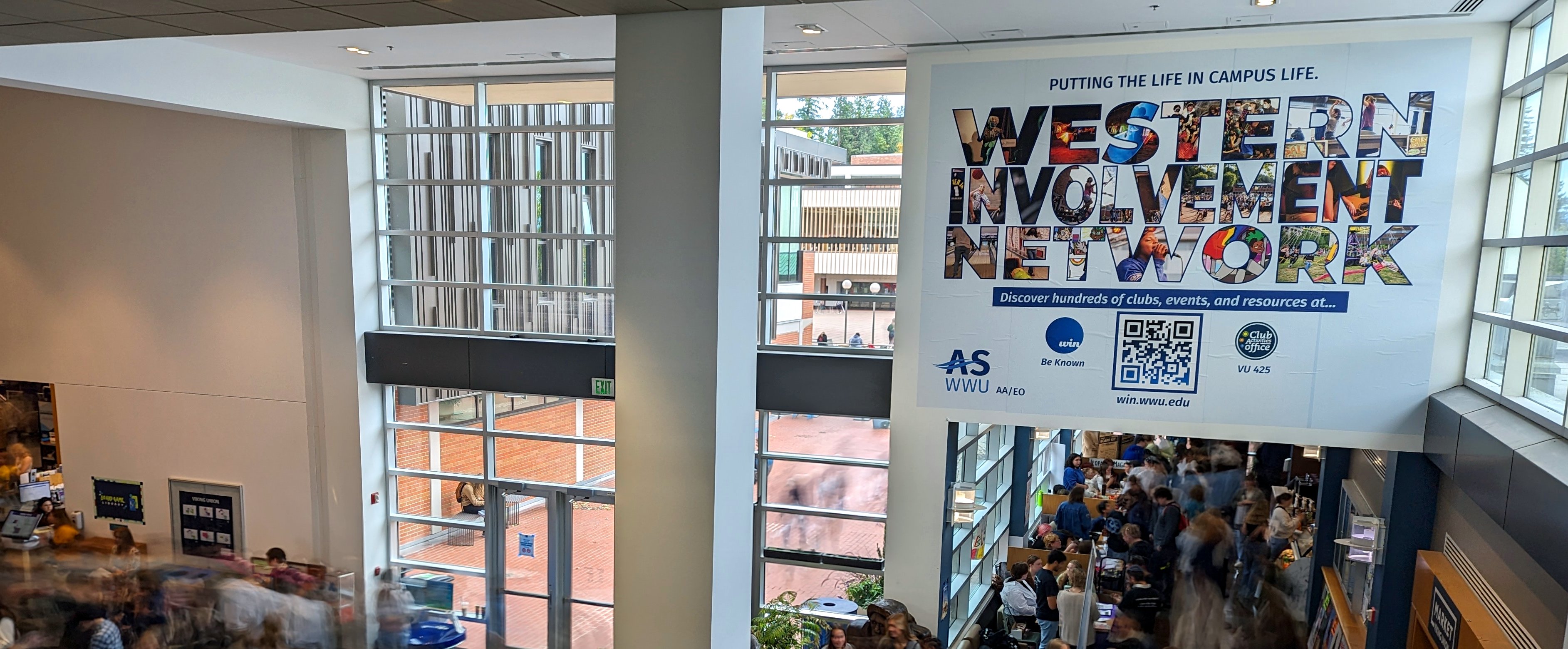Recycle Center
About
The Recycle Center is an on-campus recycling service with an almost all-student staff. We gather recyclables from approximately 650 barrels in the academic buildings, the residence halls, and the dining areas on campus, and then sort their contents by hand. We operate mainly as a collection and redistribution entity with the goal of eliminating contaminant sources in the university's recycle stream before the materials go to Northwest Recycling, Whatcom County's recycling business. Because Western's students and staff come here with different levels of recycling knowledge, our Education Coordinator works to bring a basic knowledge of recycling practices to all members of WWU's community, and further reduce the amount of waste contamination in the recycling, as well as the amount of recyclables that go into landfills.
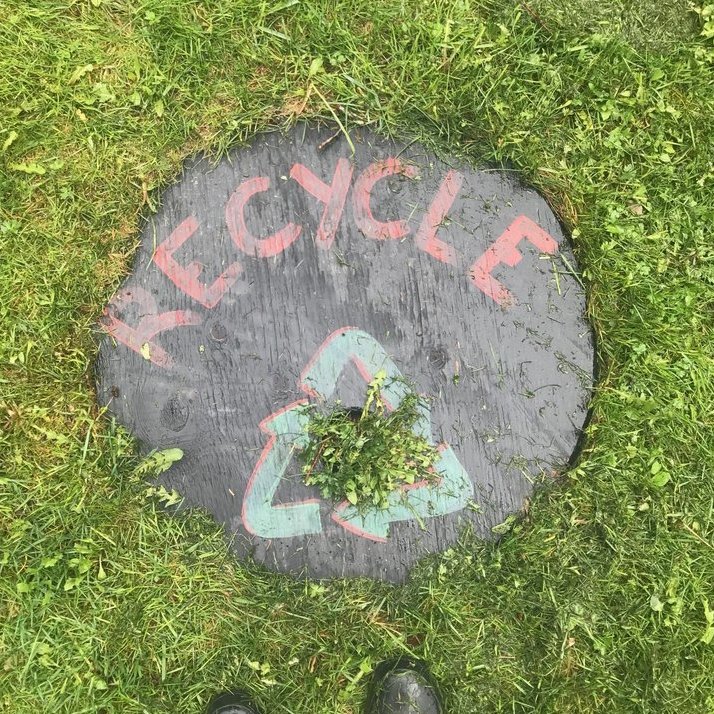
Mission
The mission of the Recycle Center is to provide the opportunity for students, faculty, and staff to recycle on campus, to educate the University community on the recycling process at Western, and to continually increase our collection efforts in order to reduce Western's waste stream. In addition to this, we provide student employment opportunities and work experience, specifically in recycling and waste management.
Need Services?
Call (360) 650-3088 or e-mail us at as.recycle.center@wwu.edu to get in touch with us, or visit our Recycling Guides page for more information.
History
In 1971, a small group of College of the Environment (formerly Huxley College) students and the University General Stores started one of the first campus recycling programs in the country here at Western. The group of ten students collected about 233 lbs. of recyclables from the university’s campus every day. In 1976, the Associated Students of Western Washington University incorporated the Recycle Center, and began its commitment to the program. Today, a full-time coordinator heads a group of 15-20 students who collect about 4,000 lbs. of recycled material every day from the blue barrels on campus. Though a lot has changed during the past fifty years, our purpose remains the same: to provide as many recycling opportunities on campus as possible, thereby reducing our consumption of natural resources and our impact on the environment.
Why is working at the recycling center important to you?
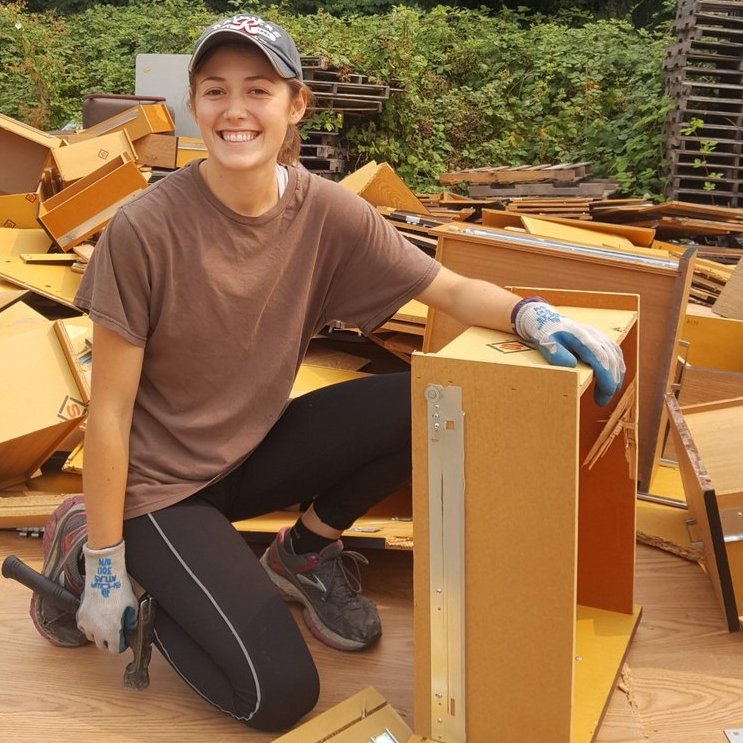
Working at the Recycle Center has been my favorite part of my time here at Western. I have made lifelong friends over our common interest in keeping campus recycling functioning, and I have learned a wide range of labor and teamwork skills in the process. I love it here.
~Rilke
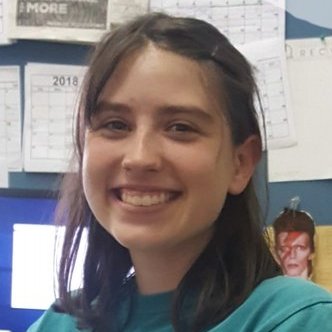
It is profound to see the effect that our work has on our campus and our campus' mission for sustainability. The recycle center was built from the ground up by students who wanted to make a difference on their campus and that effort is still carried on today.
~Megan
Working at the Recycle Center has been one of the most valuable experiences of my academic career. I started this job eager to learn more about the recycling process and environmental sustainability but ended up learning so much more. I feel that I have developed my communication, leadership, and presentation skills. My favorite part of being a Recycle Center employee is getting to work alongside a great group of people who are easy going, aren’t afraid to get their hands dirty, and share the same passion for sustainability.
~Former employee
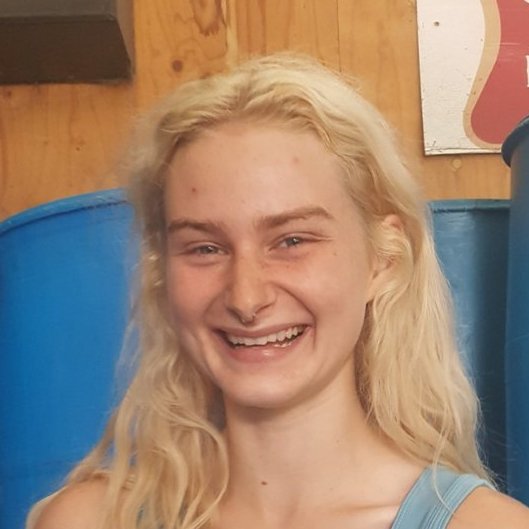
Working at the recycling center makes me more conscious of my actions on campus in relation to other people’s jobs and in relation to the environment.
~Kelsey
The intricacies of what goes into the recycling process, as well as new skills such as operating vehicles like forklifts, using hand tools, power tools, and overall becoming more manually competent.
~Former employee
Zero Waste Western
The Zero Waste Assistant inbox has been deactivated. Please direct all emails to zerowaste@wwu.edu. Thank you!
About Us
Zero Waste Western is a program through the Recycle Center that collaborates with the WWU community to provide responsible waste sorting education and implement facility changes to reduce waste. The team conducts waste audits on university garbage, recycling, and compost systems to increase awareness of the environmental, social, and economic impacts of waste. Zero Waste Western educates community members through presentations, social media, and workshops.
Our Data
Zero Waste Western conducts waste audits of on campus recycling and waste disposal stations. This allows us to better analyze the rate of contamination and wrongly sorted material. This also helps us identify the most common sorting mistakes and plan educational campaigns to minimize our waste on campus.
If you would like more detailed data please reach out via zerowaste@wwu.edu
Get Involved
Instagram @zero.waste.western
Contact Us
Zero Waste Coordinators
Ethan Granat & Emma McGreevy
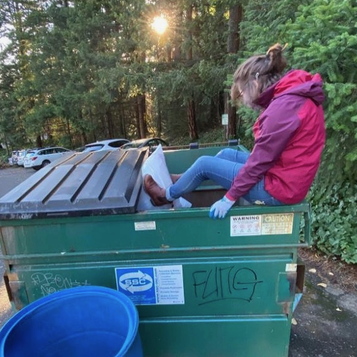
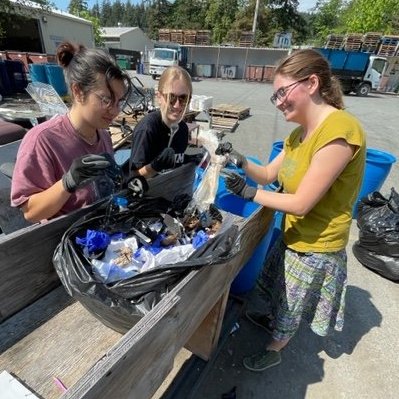
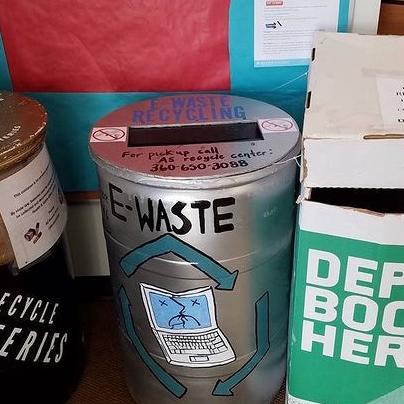
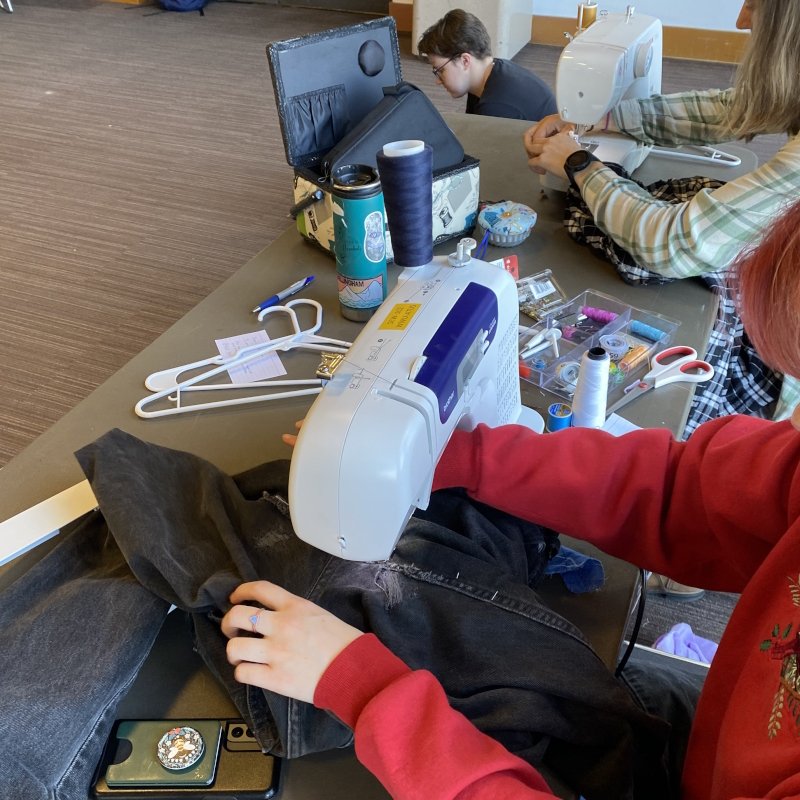
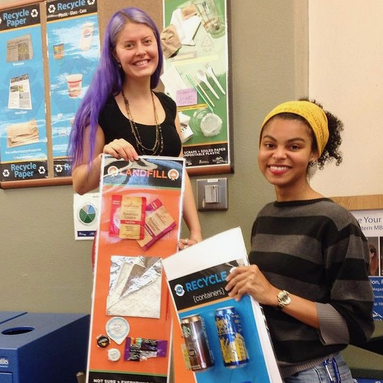
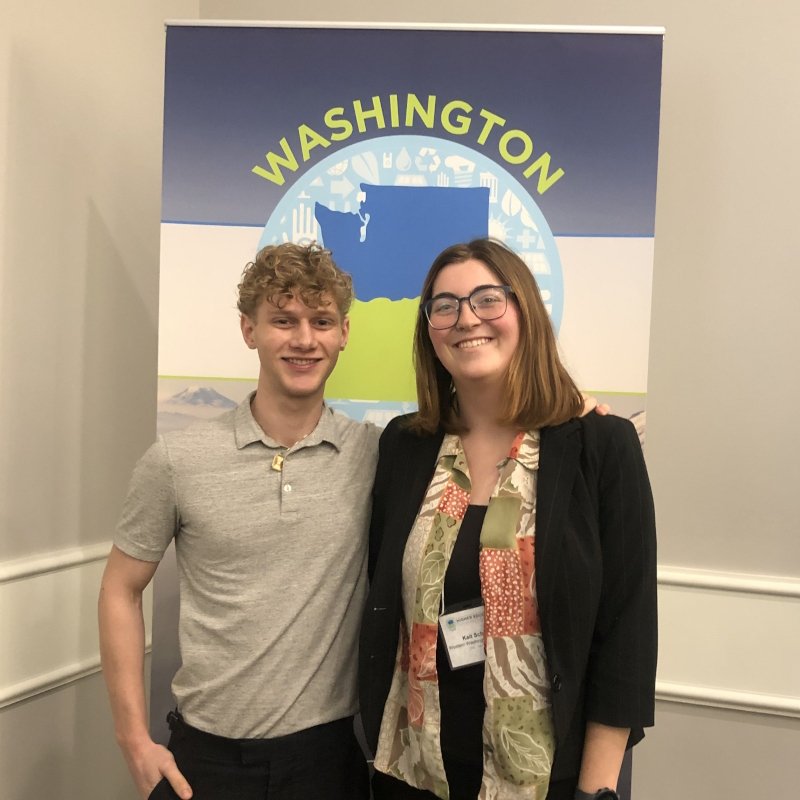
Recycle Guides
Three General Rules
- Paper can be recycled if it isn't mixed with plastic or foil, and if it isn't food soiled. Food soiled paper belongs in Food Plus Compost bins, and plastic or foil-lined paper belongs in bins labeled "trash" or "landfill."
- Most plastics are recyclable, including bottles, jugs, caps, cups, lids, jars, tubs, pails, and buckets in the barrels labeled "plastics" or "aluminum, plastic, glass, tin." Styrofoam and plastic bags, however, are NOT recyclable on campus.
- Only corrugated cardboard should go in the cardboard recycling. Items such as cereal boxes belong in "mixed paper" barrels.
Recyclable
- Notebook paper
- Spiral notebooks (Metal spirals can be recycled, but plastic ones need to be removed.)
- Computer paper
- Newspapers
- Magazines
- Phone books
- Textbooks
- Envelopes
- Post-it notes
- Paperboard
Non-recyclable
- Waxed food/drink containers (milk carton)
- Paper coffee cups
- Plastic notebook spirals/covers
- Laminated paper
- Used paper plates
- Q-Tips
- Cotton balls
- Tissues
- Used paper towels
- Sticker backing
Recyclable
- All colors and numbers 1-7 of bottles
- Cold beverage cups & lids
- Hot beverage lids
- Jugs, cups, jars, tubs
- Pails and buckets
- Dairy, deli food, sauce/condiment & cooking oil containers without clamshell hinges
- Soap, detergent, & household cleaner containers
- Snack food & frozen food containers
- Hair/body care bottles and containers
Non-recyclable
- Plastic grocery bags
- Thin plastic film
- Ziploc bags
Recyclable
- All types of cans
- Clean aluminum foil
Non-recyclable
- Microwave meal boxes with foil inside
- Metallic food wrappers
Recyclable
- All colors and types of bottles accepted
Non-recyclable
- Mirrors
- Windows
Recyclable
- Corrugated cardboard ONLY (thick and durable)
- Break down all of your boxes before recycling them
Non-recyclable
- Paperboard (Cereal boxes, tissue boxes)
- Mixed paper of any kind
Compostable
- Food waste
- On campus coffee cups
- #7 plastic found on campus
- Food soiled paper/cardboard (pizza boxes)
- Coffee grounds
- Parchment/Waxed Paper
- Ice Cream Cartons
- Small Wood Scraps
- Milk or juice cartons that are not shelf-stable (plastic lid must be cut out)
Non-compostable
- Food still in packaging (unless packaging is paper)
- Plastic (unless #7)
Non-Recyclable
The following items are NOT recyclable in Bellingham:
- Shelf-stable* milk & juice cartons
- Paper coffee cups (these are compostable, though!)
- Hinged/clamshell containers
- Styrofoam
- The following plastic products:
- overhead transparencies
- plastic caps
- sticker backing
- rings
- pumps
- hinged/clamshell containers
- bags
- wrap
- tableware/utensils
- pipe
- toys
- Insulation or plastic containers that held potentially hazardous products such as:
- motor oil
- antifreeze
- solvents
- pesticides, etc
- Plate glass (such as mirrors or dishes)
Cartons that are foil or plastic-lined that have a long shelf life prior to opening (e.g. Tetrapak's containing alternative milk, soup, broth, etc.). Check bottom of carton if you are unsure. It usually says Tetrapak!
FAQ
No. If purchased on WWU campus, hot coffee cups are 100% compostable (including lids and sleeves) in the Food Plus containers or in compost bins in the campus cafés.
No. If purchased on WWU campus, cold coffee cups are also 100% compostable in the Food Plus containers or in compost bins in the campus cafés.
Yes, but if they are food soiled please put them in the compost without plastic tables.
All plastics labeled 1-6 are recyclable in Whatcom. 7 plastics bought on campus are compostable. Bottles, jugs, caps, cups, lids, jars, tubs, pails, and buckets are recyclable in the barrels labeled "aluminum, plastic, glass, tin." Plastic bags and Styrofoam, however, are NOT recyclable on campus. Instead, Styrofoam belongs in bins labeled "trash" or "landfill" rather than in recycle barrels, and reuse plastic bags or look for the bag recycling containers at grocery stores, instead of sending them to landfills.
No. Q-tips, tissues, condoms, feminine products, and band-aids should be placed in bins labeled "trash" or "landfill" rather than in recycle barrels.
At the Bookstore front entrance, or at residence hall front desks.
At the Bookstore front entrance, or in Recovery Drive barrels near your residence hall’s recycling depot at the end of each quarter.
We are an on-campus job that hires through the Western jobs page. Positions are part time and run until graduation.

